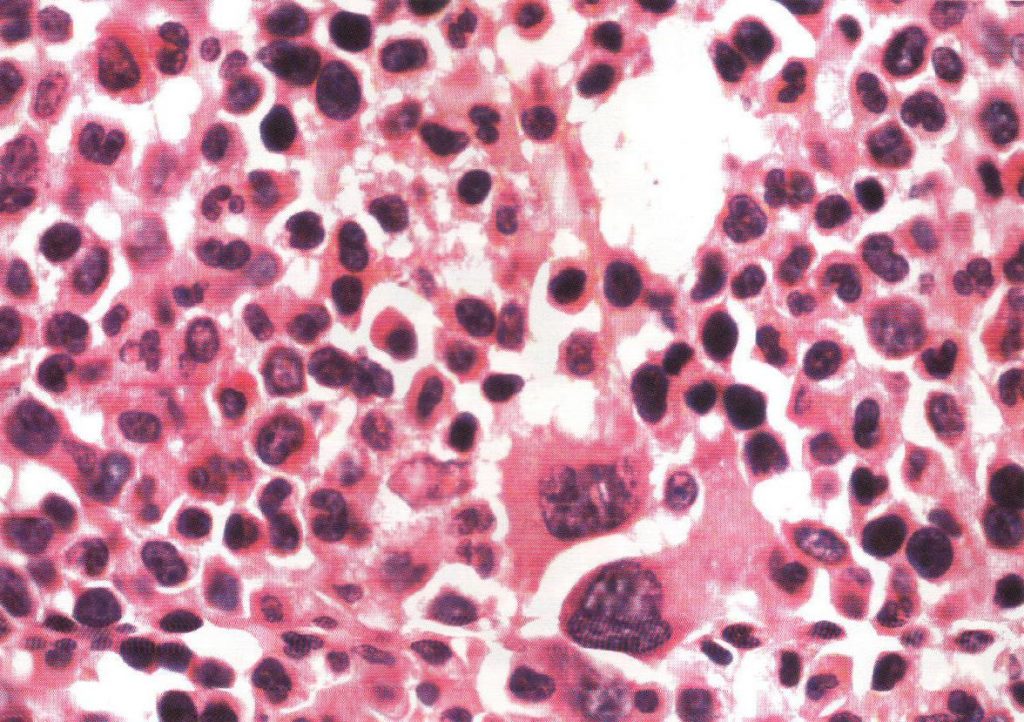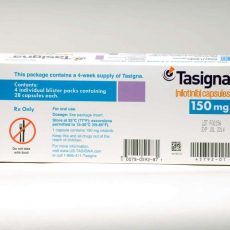【Product name】Tasigna, Dasina
[English common name]Nilotinib
[Chinese common name] nilotinib
[English name]
[Other names in Chinese] nilotinib
[indications]
Nilotinib: Philadelphia chromosome positive for resistance or intolerance to previous treatments (including imatinib)Chronic myeloid leukemia(Ph+ CML) Chronic or accelerated adult patients.
Dasina (Nilotinib Capsule): Chronic or accelerated adult patients with Philadelphia chromosome-positive chronic myelogenous leukemia (Ph+ CML) who are resistant or intolerant to previous treatments (including imatinib).
【Dosage】
Nilotinib:
The initial treatment of this product should be carried out under the guidance of a physician with experience in the treatment of CML patients.
The definition of imatinib resistance is: imatinib failed to achieve complete hematologic remission for 3 months, failed to achieve cytogenetic remission after 6 months of treatment, or failed to achieve major cytogenetics after 12 months of treatment Relief, loss of complete hematologic remission or cytogenetic remission, disease progression, or emergence of resistant Bcr-Abl kinase mutations.
The definition of imatinib intolerance is that, despite optimal supportive care, patients are discontinued with imatinib due to the persistence of grade 3 or 4 adverse events during any dose and/or treatment period; or Despite the use of optimal supportive care, grade 2 adverse events associated with imatinib therapy lasted for > 1 month, or more than 3 times, regardless of dose reduction or discontinuation of treatment.
The recommended dose is 2 times daily, 400 mg each time, about 12 hours apart, at least 1 hour before meals or at least 2 hours after meals.
As long as the patient continues to benefit, the treatment of this product should continue.
Dasina (Nilotinib capsule): The initial treatment of this product should be carried out under the guidance of a physician with experience in treating CML patients.
The definition of imatinib resistance is: imatinib failed to achieve complete hematologic remission for 3 months, failed to achieve cytogenetic remission after 6 months of treatment, or failed to achieve major cytogenetics after 12 months of treatment Relief, loss of complete hematologic remission or cytogenetic remission, disease progression, or emergence of resistant Bcr-Abl kinase mutations.
The definition of imatinib intolerance is that, despite optimal supportive care, patients are discontinued with imatinib due to the persistence of grade 3 or 4 adverse events during any dose and/or treatment period; or Despite the use of optimal supportive care, grade 2 adverse events associated with imatinib therapy lasted for > 1 month, or more than 3 times, regardless of dose reduction or discontinuation of treatment.
The recommended dose is 2 times daily, 400 mg each time, about 12 hours apart, at least 1 hour before meals or at least 2 hours after meals.
As long as the patient continues to benefit, the treatment of this product should continue.
Capsules should be swallowed with water and should not be chewed or sucked. Capsules should not be opened. Wash hands immediately after touching the capsules. Be careful not to inhale any powder in the capsule (such as capsule damage), and do not allow the powder to come into contact with skin or mucous membranes. If skin contact occurs, wash the area with soap and water. If the eyes are in contact with the powder, rinse with water. If the powder in the capsule is spilled, it should be wiped off with gloves and a disposable wet towel and placed in a sealed container for proper disposal.
Dose adjustment: If the ECG shows QTc>480m, you should stop taking this product and check the serum potassium and magnesium in time. If the serum potassium and magnesium are lower than the normal limit, you should replenish it to the normal range, and you must check the merger. In the case of medication; if QTcF recovers to <450 milliseconds and does not differ from the baseline value by more than 20 milliseconds, the previous dose of the product can be restored within 2 weeks; if after 2 weeks, QTcF is between 450 and 480 milliseconds, then The dose of this product should be reduced to 400 mg once a day; if the QTcF is still > 480 milliseconds after reducing the dose to 400 mg per day, the product should be discontinued. Any 1 dose adjustment should be reviewed after 7 days.
If hematological toxicity occurs (acceleration period: ANC < 0.5 × 109 / liter or platelet < 10 × 109 / liter; chronic phase: ANC < 1.0 × 109 / liter or platelet < 50 × 109 / liter), this product should be suspended Use, if the blood level of patients in the accelerated phase within 2 weeks recovers to ANC>1.0×109/liter or platelet>20×109/liter or above, or the blood level of patients in chronic phase recovers to ANC>1.0×109/liter or platelet>50×109/ If you are liter, you can take it again at the initial dose. If the blood picture is still low, consider reducing the dose of this product, taking it once a day, 400 mg each time.
If there is moderate or severe non-hematologic toxicity with significant clinical significance, the drug should be discontinued; once the toxicity is relieved, the dose of 400 mg once a day can be restored. If clinically appropriate, consider increasing the dose to 400 mg twice daily.
Elevated serum lipase: If 3-4 levels of serum lipase increase, the dose should be reduced to 400 mg once a day or discontinued. Serum lipase should be monitored monthly.
Elevation of bilirubin and liver transaminases: If there is an increase in grade 3-4 bilirubin, the dose should be reduced to once a day, 400 mg each time or discontinued. Bilirubin and transaminase should be monitored monthly.
*Special dose recommendation
Children and adolescents: There are no clinical studies conducted in children or adolescents. Therefore, it is not recommended for the treatment of patients younger than 18 years old.
Elderly patients: No special dose adjustments are required for patients over 65 years of age.
Patients with renal insufficiency: There are no clinical studies in patients with renal insufficiency.
Only a small part of this product and its metabolites are excreted by the kidneys, so patients with renal insufficiency are not expected to have a reduction in overall clearance. For patients with renal insufficiency, no dose adjustment is required.
Patients with hepatic insufficiency: This product has not been studied in patients with hepatic insufficiency. Therefore, patients with hepatic insufficiency with a transaminase exceeding 2.5 times the normal value or 1.5 times higher than the normal value of bilirubin are not recommended for treatment.
[Storage] Tasigna (nilotinib) capsules should be stored at 25 ° C (77 ° F); allowable deviation between 15 ° C and 30 ° C (59 ° F to 86 ° F).
[Tips] Some of the information on this site comes from the Internet and is only used internally by pharmacists or medical staff. It is not a substitute for doctors to diagnose face to face. Please consult a professional pharmacist for specific medications. Please refer to the actual product manual or the actual product for the product content.

-1-230x230.png)
